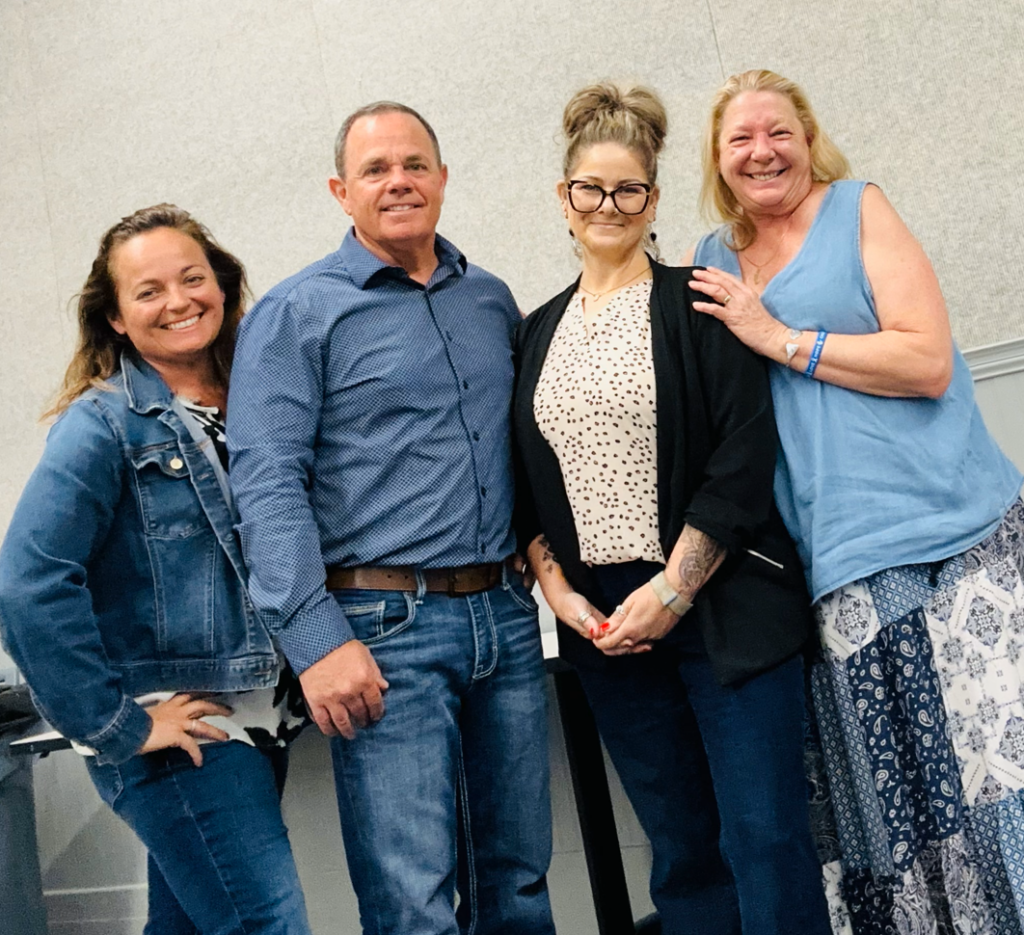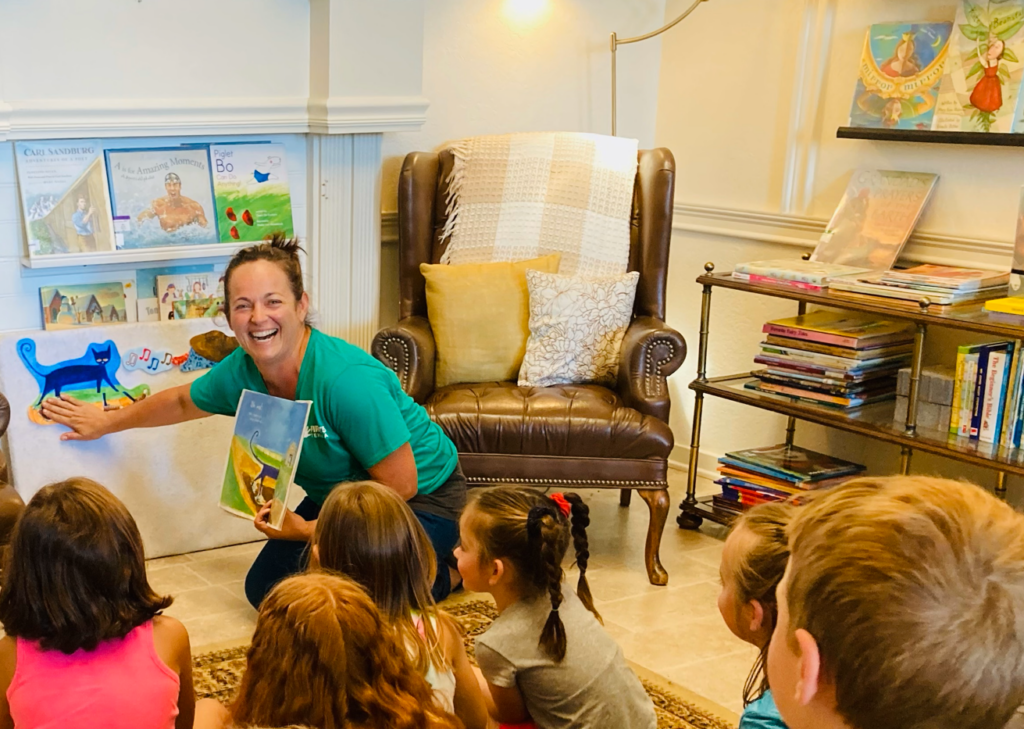Author: Heidi Mendenhall, Executive Director, First 5 Tehama
Amidst the natural beauty we have here in Tehama County, there is a grimmer reality that often gets overlooked. As an active community member doing my part to support children and families – including growing my own in Tehama County – I’ve seen firsthand the unique struggles that impact my home.
Even before COVID hit, Tehama and our neighboring counties experienced some of the highest rates of what we call Adverse Childhood Experiences or ACEs. ACEs are stressful or potentially traumatic experiences that happen before the age of 18 like having a caregiver who struggled with mental health or substance use, witnessing domestic violence, or experiencing abuse or neglect.

Heidi and Commission Members on Sexual Assuault Awareness Prevention Day
Unique Adversities Impacting Mental Health in Tehama
Beyond ACEs, there are other adversities we have experienced that can also impact the health of our community—some that are unique to Tehama. These include natural disasters, rural isolation leading to a lack of access to health care providers, and an alarming increase in suicides.
We sit geographically between two of the most recent and famously devastating fires—The Carr Fire and The Paradise Fire. There is not a neighborhood in Tehama that doesn’t have a child who either lost their home, housed a family who did, or knows someone who did.
Furthering this devastation is the lack of mental health providers in our rural region to address the needs of our children, families and first responders—who are also the parents of our students.
One afternoon when I had reached a point of need for my family, I personally called every counseling center in the county and was told that either they were not taking new patients or the wait was six weeks.

Heidi Mendenhall local book reading at library
Six weeks is a long time to wait when you have finally mustered the courage to make the call and ask for help.
We know these experiences can lead to toxic stress and have a significant impact on our health and development. And we know that healthy relationships make a difference.
This is where the bright side lives. In Tehama, Colusa and Glenn counties, one of our strengths is children feeling that adults show genuine interest and care – this is one of a handful of what is referred to as Positive Childhood Experiences.
The Value of Safe Spaces in Tehama
That’s why I was excited to learn about the Office of the California Surgeon General’s trauma-informed training, Safe Spaces. Safe Spaces: Foundations of Trauma-Informed Practice for Educational and Care Settings is a free, online training designed to help individuals in and outside of the school and early care settings understand and respond to trauma and stress in our youth. Safe Spaces not only shares tools to make that possible, but the training is also self-paced, available in English and Spanish and includes three modules for individuals working with children ages 0-5, 5-11 and 12-18.
These qualities make it uniquely valuable for rural communities like Tehama. We often have educators working as a paraprofessional in a TK classroom in the morning and shifting to an afterschool program for 3rd and 4th graders in the afternoon. With more than 30% of young children speaking a language other than English, it’s common for family childcare providers or neighbors to interact with children in Spanish.
The flexibility of the Safe Spaces training honors the fact that anyone who regularly interacts with youth has the unique opportunity to build relationships and reshape critical interactions with those who may be overwhelmed or struggling.
How Tehama is Leveraging Safe Spaces
In February, California Surgeon General Dr. Diana Ramos visited Bend Elementary in Red Bluff to talk about the goals of the training and see first-hand how Tehama early care providers and schools are supporting the mental health of our children and youth.
One of the highlights of this visit was an interaction between a Kindergartener and Dr. Ramos in the classroom “calming corner.” When Dr. Ramos asked when the calming corner is used the 4-year-old TK student replied, “when we are stressed.” This emotional lexicon used by a 4-year-old is a clear example of the Safe Space’s strategies being implemented. Naming our feelings in both students and adults is a repeated theme in many of the Safe Spaces modules.

Members of Head Start Tehama Who Have Taken Safe Spaces
First 5 Tehama has proudly promoted the training throughout the early childhood community across the region. As a result, Northern Child Development Inc.—a provider of Early Head Start and Head start in Tehama County—is on track to train over 70 staff by the end of May.
Once accomplished, the strategies gleaned from Safe Spaces will touch over 240 children in this program year and will continue year after year. Even the veteran teachers have found the reminders to pause and reflect beneficial. While 240 may be not hold statistical significance in relation to the millions of California’s children, in Tehama these 240 children hold great significance.
They are quite literally our families, friends and neighbors.
Hope for a Brighter, Healthier Future
Safe Spaces itself is not a universal cure for the challenges that my community faces. It is also just one piece of the California Children and Youth Behavioral Health Initiative—a much more comprehensive effort to reimagine the systems that support California’s children and youth. At First 5 Tehama we look forward to more opportunities like this with flexible supports that can be utilized within the rural context and are not limited by statistically significant population impact. We appreciate knowing that our children matter in Tehama as much as they do in the cities.
The initiative is an important step in the right direction—a symbol of a broader commitment by the state of California to invest in resources and programs that prioritize the mental health of our students, early care providers and educators and lean into the geographical diversity of the state. I encourage you to learn more and take the training: https://osg.ca.gov/safespaces.

